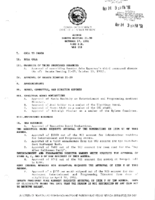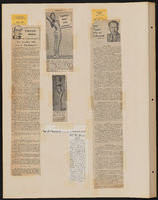Search the Special Collections and Archives Portal
Search Results

Transcript of interview with Burton Cohen by Claytee White, January 9, 2009
Date
Archival Collection
Description
In this interview, Burton Cohen discusses his involvement in the Las Vegas casino industry, including booking entertainment for various hotels.
Burton Cohen's long casino executive career began in the mid-1960s when he accepted a proposition to become involved with the transformation of the Frontier Hotel. He left his south Florida roots and law practice to become a co-owner/general manager of the Frontier Hotel. Thus, began his highly regarded Las Vegas presence. For nearly four decades he served in the management of some of the Strip's most famous casinos: Flamingo, Dunes, Circus Circus, Caesar Palace, Thunderbird and the Desert Inn, which remains his favorite. In this interview, Burt reflects on the positions he held, the celebrities he hired and befriended, and offers a unique look at the behind the scenes marketing and entertainment strategies that he helmed. He shares stories of becoming entrenched in casino operations, his reflections of union experiences, and even anecdotes about moving his mother to Las Vegas.
Text

Transcript of interview with Elaina Blake by Stefani Evans and Claytee D. White, September 19, 2016
Date
Archival Collection
Description
Coming from humble beginnings, Elaina Blake grew up in Port Orchard, Washington, where her father was in the logging industry and she involved herself in the love of horseback riding. After becoming engaged at age 16, she married the following year at 17 and moved to Las Vegas where she started as a statistical typist at the Sahara Hotel and Casino. This led to a position her to become an executive secretary at the Thunderbird where she dealt with the rampant sexual harassment that was typical of the executive office environment in the industry at the time. The rejection of those advances led her to start her career in real estate with Roberts Realty where she sold her first group of homes off of Nellis Boulevard and Tropicana Avenue. In 1976, she made the entrepreneurial move by buying into Roberts Realty, becoming an owner, and eventually buying out Young American Homes. She started giving back to the community through her service as being the first woman elected to president elect for the Chamber of Commerce in 1984 and also served on the Clark County Planning Commission for four years serving as vice chairman and chairman. She did such a wonderful job running the chamber, she was approached to run for Lieutenant Governor. Her involvement with the community increased during this time as she got involved with the United Way, saved the YMCA from closure and started the Focus School Project in 1989 with former superintendent Brian Cram where businesses adopt schools and provide money and volunteer. This project is still in operation today and has given back $8 million dollars to CCSD in volunteerism. During her time with the Chamber, she continued to work with major local builders such as Pageantry Homes, Heers Brothers, and Christopher Homes, which led to her taking another entrepreneurial milestone by taking a small team to create Blake and Associates. In 1996, Blake leveled up to become a developer starting with office buildings. As a champion for the inclusion of women, she never felt held back because of her gender and she always encouraged women in the Chamber to give more of themselves, even if it was for ten minutes because the men did so. In a male-dominated industry, Elaina Blake has been a trailblazer for women in business and the housing industry in the valley.
Text

Nora Mirabal interview, August 30, 2019: transcript
Date
Archival Collection
Description
Interviewed by Elsa Lopez and Barbara Tabach. Cuban refugee family by way of Spain and then to the US; arrived in Las Vegas in 1973 when Nora was 9 years old. Struggled in youth but rises up as embraces educaton. Currently is Assistant Director of Academic Partnership at CSN.
Text

Transcript of interview with Flo Mlynarczyk by Claytee White, July 7, 2005
Date
Archival Collection
Description
Flo Mlynarczyk began life in Fort Morgan, Colorado. Her parents divorced and she moved with her mother first to Loveland and eventually to Los Angeles. Her mother started the first Red Cross in Bell Gardens, oversaw the building of their home, and raised money for various charities. Flo remembers when the Japanese were rounded up and interred during WWII. She was in grade school and recalls that one day they all just disappeared. Upon graduation from high school in 1943, Flo moved to Kodiak, Alaska, to live with friends. She recalls total blackouts on the streets of Kodiak due to the war, the Short Snorter Club, and her return to California after a bout of pneumonia. Back in Bell Gardens, Flo worked for a department store, married and divorced in 1945, gave birth to her son Michael in 1946, and ended up in Tonopah, Nevada, with a sister who ran a cafe there. After a second marriage ended, Flo moved to Las Vegas and began working at Phelps Pump and Equipment as a bookkeeper.
Text

Transcript of interview with Christopher Maestas by Claytee White, September 14, 2008
Date
Archival Collection
Description
Christopher “Chris” Maestas (1965-2009) was an engaged educator and leader within the Chicano, Latinx, and Henderson communities. As he traced back his Latinx heritage, he explored his father’s hometown in Llaves, New Mexico, where he and his family were discriminated for their non-white demeanor; and his mother’s paternal Spanish roots; his grandfather came to work in Henderson, Nevada at the Basic Magnesium Industrial (BMI) plants during World War II. The Chicano and Spanish cultures played a significant part in defining his role within the community. For Chris, Chicanos were “people that lived in the southwestern United States particularly southern Colorado, New Mexico and northern Arizona that were originally Mexican citizens before the treaty (Treaty of Guadalupe Hidalgo) was signed and then after the treaty was signed they became Americans.” In this interview, he dives into the difference between Chicano and Spanish cuisine and gives his own tips on how to make Spanish chile relleno. Chris discussed what life was like in Henderson living in Henderson Camp when his grandfather emigrated from Spain in 1943. He described the evolution of the Henderson community in the 50s through his parents’ experiences living in the Hispanic communities of Victory Village and Carver Park. During his childhood in the early 70s, Chris recalled living in Henderson when it was known as Basic and living in a small town-site house. One of his most special recollections was from the summer of 1980, when his family purchased their first set of air-conditioning units. As a passionate teacher and 1984 alumnus from Basic High School, he advocated student engagement as Student Council Advisor. Chris was also an active member of the St. Peter the Apostle, Catholic Church, Knights of the Columbus group and LUPE (Latinos United for Perfect Equality) Club. The LUPE club promoted equality for the Hispanic community and family values. Chris described their Saturday picnics at BMI Park and the annual Henderson Industrial Days festival.
Text

Transcript of interview with Pamela Gale by Margaret Louis, July 10, 1995
Date
Description
Text

Interview with Ian Dominic Zabarte, April 4, 2007
Date
Archival Collection
Description
Access note: Audio temporarily sealed. May not quote in any form without written permission from interviewee
Text

Meeting minutes for Consolidated Student Senate University of Nevada, Las Vegas, October 17, 1991
Date
Archival Collection
Description
Text


